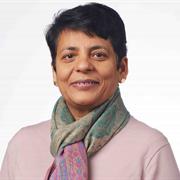
Dr. Shilpi Tewari
Details
-
Department: School of PCPM
-
Campus: City Campus Australia
-
shilpi.tewari@rmit.edu.au
-
ORCID: 0009-0007-3185-4972
About
Dr. Shilpi Tewari is a highly experienced academic and researcher with expertise in urban planning, air quality, and construction management. Currently serving as a Research Fellow (Postdoc) at RMIT University under the Healthy Environment And Lives (HEAL) Network, she leads innovative projects focused on localised air-quality monitoring to improve urban livability and public health.
In addition to her research role, Dr. Tewari has over a decade of experience teaching at Deakin University, where she has delivered courses on urban design, construction management, and building material science. She has developed online courses such as "Clean Air for Urban Livability" and contributed to multiple academic units and research projects. Her teaching portfolio spans both undergraduate and postgraduate levels, with responsibilities including lectures, tutorials, assessments, and research supervision.
Her professional background includes roles as a town planner at Wyndham City Council and an architectural design drafter. Dr. Tewari holds a PhD in Architecture from Deakin University, a Master's in Social Engineering from the Tokyo Institute of Technology, and a Bachelor's in Architectural Engineering from the National Institute of Technology, Calicut.
Research fields
- 441013 Sociology of migration, ethnicity and multiculturalism
- 370102 Air pollution processes and air quality measurement
- 3304 Urban and regional planning
Teaching interests
Dr. Shilpi Tewari is an experienced educator with over a decade of teaching in higher education, specialising in construction management, urban planning, and urban design. She has served as a casual academic at Deakin University and RMIT University, where she has taught both undergraduate and postgraduate courses. Her teaching portfolio includes a diverse range of subjects such as Building Material Science, Research Methodologies, Structural Principles in Construction, Urban Ecologies, Smart Cities and Infrastructure, Urban Design and Planning.
In her teaching practice, Dr. Tewari emphasises a student-centered approach, fostering active learning through interactive lectures, discussions, and hands-on tutorials. She is committed to helping students engage critically with course material, develop practical problem-solving skills, and apply theoretical knowledge to real-world challenges. Dr. Tewari has also guided students in their research projects, providing supervision and mentorship to undergraduate and Master’s students in areas related to construction management, urban design, and research methods.
Dr. Tewari’s innovative contributions to curriculum development include designing and delivering the online course "Clean Air for Urban Livability" for Future Learn and RMIT Europe. This course showcases her ability to integrate research and teaching, particularly around her areas of expertise in urban livability and air quality. She is skilled in blended learning, leveraging both face-to-face and online platforms to enhance the learning experience.
Her teaching philosophy is rooted in interdisciplinary learning, drawing connections between urban planning, environmental science, and construction to provide students with a holistic understanding of the built environment. She actively incorporates industry trends and research findings into her teaching to ensure her students are prepared for the dynamic challenges of their professional fields.
Research interests
Dr. Shilpi Tewari's research interests are centered around urban livability, air quality, and the built environment, with a strong focus on how these factors intersect to influence public health and well-being in urban settings. Her current work at RMIT University under the Healthy Environment And Lives (HEAL) Network highlights her commitment to addressing environmental and health challenges through innovative approaches.
A key area of her research is the deployment of localised air-quality monitoring systems using low-cost sensors. By generating high-resolution, neighborhood-scale air quality data, Dr. Tewari aims to better understand spatial variations in pollution levels and their impact on public health, particularly in urban communities. This data is vital for informing local policy interventions and improving urban livability, aligning with her broader interest in integrating environmental quality into liveability metrics.
Another core theme in Dr. Tewari's research is the relationship between urban planning and multiculturalism. She has explored how ethnic diversity and urban design contribute to neighborhood character and livability, with a particular focus on suburban developments in Melbourne. Her work on master-planned estates and the role of developers in shaping the built environment underscores her interest in how urban design influences social outcomes.
Overall, Dr. Tewari's research is multidisciplinary, addressing pressing urban challenges through the lenses of environmental science, urban planning, and public health. She is particularly interested in how data-driven insights can enhance urban liveability and contribute to the development of healthier, more sustainable cities.


